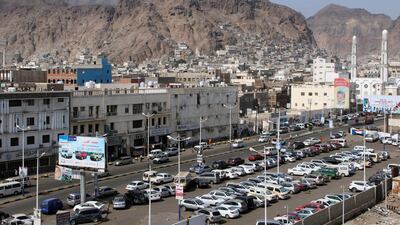Residents of Yemen's southern city of Aden are complaining of frequent internet outages at a time when the coronavirus pandemic has forced a shift to online work.
The city regularly experiences disruptions in internet access, which has been used as bargaining chip between the internationally recognised government that controls southern Yemen and the Houthi rebels who hold much of the north. The problem of outages and slow speeds is compounded by frequent electricity cuts after clashes for control of the city in 2015 affected power services.
Internet users experienced outages again on Friday and Saturday from both the city's providers, Aden Net and Yemen Net.
“I was really frustrated, I kept going from one room in the house to another trying to find a connection because I didn’t realise that the network was cut off all over Aden," said Fatima Mohammed, 24, a journalist at a news website in Aden.
She sent an SMS asking a colleague to cover her shift, but they were facing the same problem.
“As news editor the internet is a backbone for me. In my case, no internet means no work, no work means no salary. How are we going to work if such troubles continue at time the whole world works online as the Covid-19 threat continues?” she said.
A representative of Aden Net attributed the weekend outages to repairs on the company's transmission towers. However, a telecoms engineer, speaking on condition of anonymity, told The National that the company had not yet set up enough towers to handle the rapid growth in subscribers since its launch, causing the network to become overloaded.
Officials at Yemen Net, a division the country's main telecoms provider TeleYemen, declined to comment when The National visited their office on Sunday.
Omar Sheikh, 33, an executive at an advertising, marketing and film production company, said the outage completely disrupted business.
“In the last couple of days we weren’t able to open our office for our clients because we weren’t able to meet their requests without the internet," he said.
"Producing any film for any advertisement requires a network with high speed, so our ordeal begins when the internet slows down and gets worse when the internet cuts off."
Basam Al Qadhi, chairman of the Humanitarian Journalism Foundation, a nonprofit that provides free training workshops for Yemeni journalists, said he knew well how costly outages could be.
“I missed many opportunities because of the internet," he said, including participation in an international event some months ago.
"I couldn’t send some attachments required for registration because the internet was very terrible due to cable outages that time," he recalled.
“The spread of the pandemic has worsened the situation for us because we were forced to shift most of the trainings we provide to online sessions.”
According to a 2019 report by Keep It On, an organisation fighting internet shutdowns worldwide, Yemen accounted for the majority of internet shutdowns in the Middle East region.
The country was almost completely cut off from the worldwide web for weeks after a vessel accidentally severed two undersea telecoms cables in the Red Sea in January. TeleYemen said in mid February that 70 per cent of the internet connection has been restored after initial repairs.

